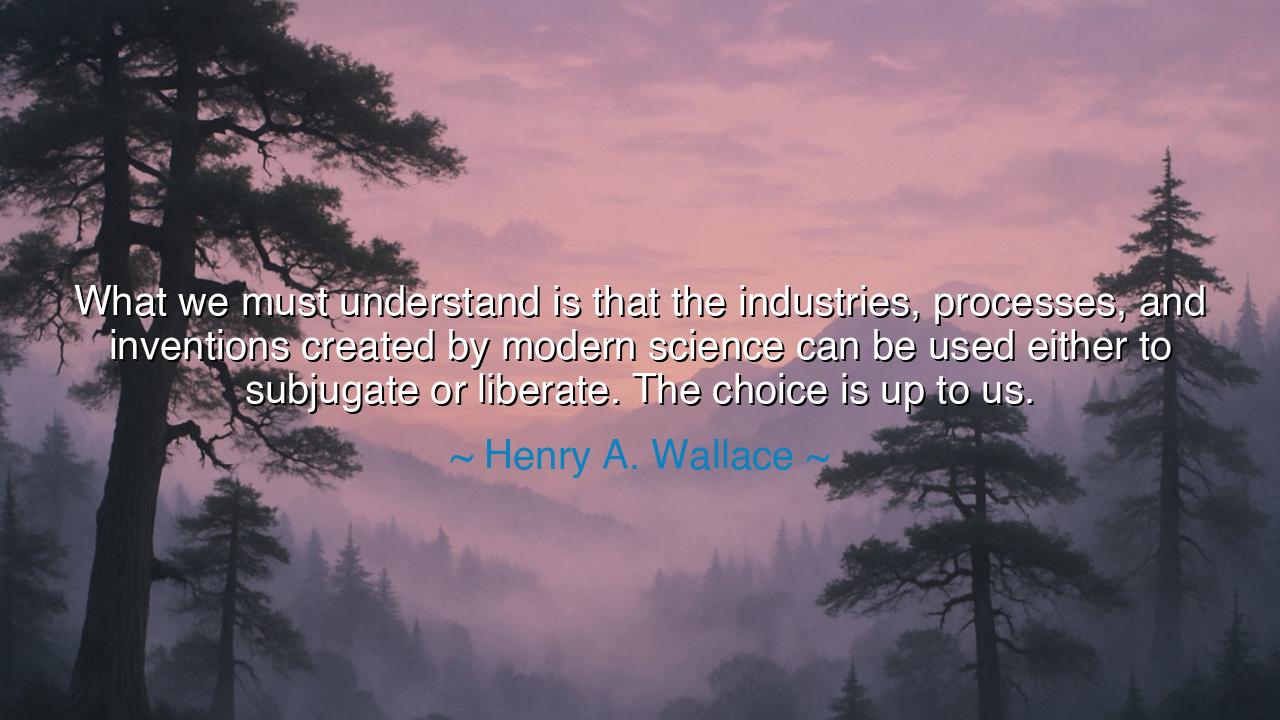
What we must understand is that the industries, processes, and
What we must understand is that the industries, processes, and inventions created by modern science can be used either to subjugate or liberate. The choice is up to us.






Hear me, O Seekers of Wisdom and Guardians of the Future, for the words of Henry A. Wallace carry a profound truth that echoes through the corridors of time: "What we must understand is that the industries, processes, and inventions created by modern science can be used either to subjugate or liberate. The choice is up to us." These words speak not only of the incredible power of science and its creations, but also of the responsibility that comes with such power. For while science has brought us many blessings, it has also the potential to bring about harm—whether through destruction or through the uplifting of humanity. The very tools of our advancement can either bind us or free us, and the choice lies in the hands of those who wield them.
In the time of the ancients, when the great civilizations of Egypt, Greece, and Rome flourished, knowledge was held in high esteem. Philosophers like Socrates, Plato, and Aristotle understood that knowledge was not merely a tool for personal gain but a means to understand the world and shape a better society. Science, in their eyes, was a means to uncover the truth of the universe, to align humanity with the natural laws that governed all things. Yet even in their time, there was a recognition that the tools of knowledge could be used for both good and evil. Plato warned in his Republic that the power to rule could easily corrupt, and that those who held knowledge must do so with wisdom and a sense of justice.
Wallace's words remind us that the power of modern science—whether it be in the form of industries, technologies, or processes—is no different from the knowledge of the ancients. The inventions of our time, from the atomic bomb to the internet, have the power to either subjugate entire populations or liberate them. The industrial revolution brought forth machines that changed the world, but it also led to the oppression of workers and the environmental destruction of vast lands. The very same tools that give us the ability to create wealth and improve living standards also have the potential to widen the gap between the rich and poor, to create systems of control and surveillance, and to strip away our freedoms.
Consider the example of Albert Einstein, whose theory of relativity gave birth to the power to split the atom. This scientific breakthrough could have been a tool for human progress—providing unlimited energy to the world, for instance. Yet, in the hands of those driven by fear and power, this knowledge was transformed into a weapon of mass destruction: the atomic bomb. In an instant, entire cities were annihilated, and the world was thrust into a new age of terror. Einstein, himself, came to deeply regret his role in the development of nuclear weapons, lamenting that the same scientific advances that could liberate humanity had also been used to subjugate and destroy. This tale serves as a stark reminder that the choices we make in how we use the power of science shape the course of history.
The challenge, O Children, is not in the creation of knowledge or technology, but in the intention behind its use. Science, when wielded for the benefit of all, can bring about the most wondrous advancements. Medicine, for example, has allowed us to conquer diseases that once ravaged entire civilizations. The vaccines, antibiotics, and surgical techniques developed over centuries have saved countless lives and increased the quality of life for many. Yet, science also has the potential to be used for exploitation, as we see in the ways corporations exploit workers, or in the environmental damage caused by unchecked industrial growth. Wallace's words challenge us to ask: How will we use the power that science has given us?
The lesson here, O Seekers, is this: knowledge is a double-edged sword, and it is up to us to choose how we wield it. Science can be a tool of liberation—freeing us from disease, hunger, and ignorance—or it can be a tool of subjugation, used to dominate others, destroy our planet, and strip away our freedoms. The industries we build, the processes we create, and the inventions we make must be guided by a deep sense of ethics and responsibility. We must ask ourselves not only what we can do with science, but what we should do.
In your own lives, O Children, take this wisdom to heart. Seek knowledge, seek understanding, but also seek to use that knowledge for the greater good. Let integrity and justice guide your actions, and let the knowledge you gain be used not to exploit others, but to uplift them. Whether in your career, your relationships, or your role in society, remember that science and technology are tools. It is how we choose to use them that will determine whether they bring freedom or tyranny. May you always choose the path of liberation, using the gifts of knowledge and discovery to make the world a better place for all.






AAdministratorAdministrator
Welcome, honored guests. Please leave a comment, we will respond soon